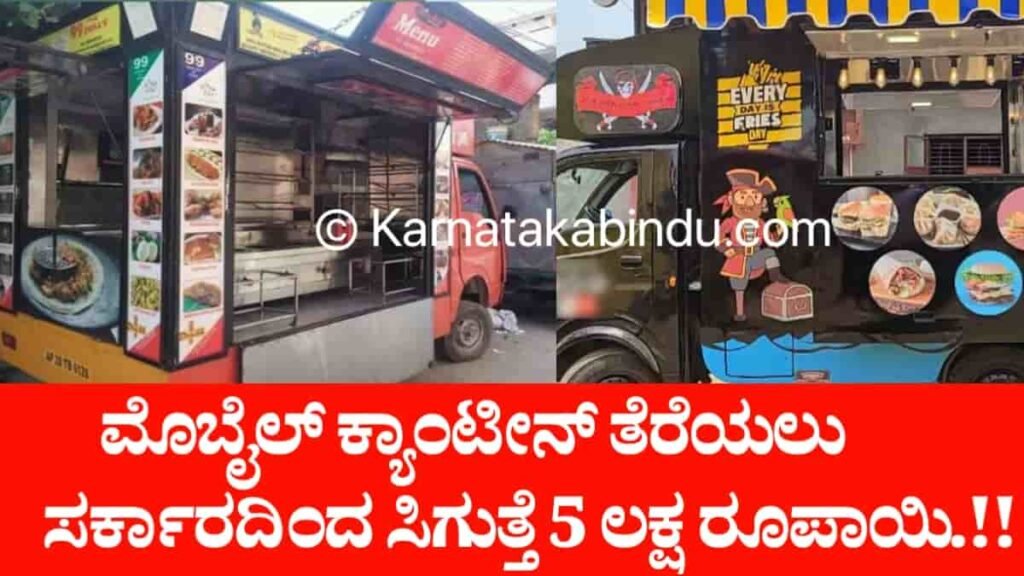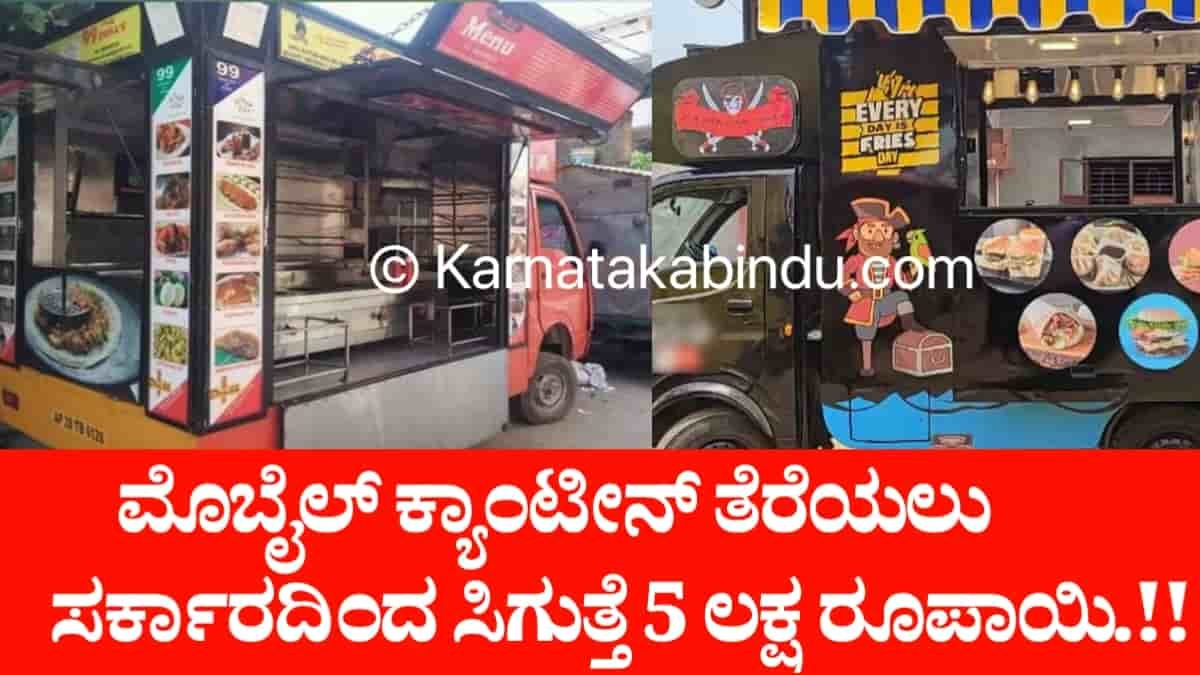Starting a business is often a dream for many young people, but the biggest challenge is always finance. Recognizing this, the Karnataka government has come forward with a new and innovative scheme that offers up to ₹5 lakh subsidy for setting up mobile canteens. This program is designed especially for the benefit of Scheduled Caste (SC) and Scheduled Tribe (ST) communities, giving them a strong financial and professional platform to begin their entrepreneurial journey.
The idea is simple yet powerful: provide financial support, training, and guidance so that young individuals can run their own food businesses on wheels. By doing this, the government is not only encouraging self-employment but also creating new avenues for affordable food services across the state.
Understanding the Scheme
The Mobile Canteen Subsidy Scheme 2025 is part of the government’s effort to promote economic empowerment under the SCSP (Scheduled Caste Sub-Plan) and TSP (Tribal Sub-Plan) programs. Through this initiative, eligible applicants will receive up to 70% subsidy on the project cost, subject to a maximum of ₹5 lakh.
This means that if you plan to start a mobile canteen with a total project cost of ₹7 lakh, the government will cover ₹5 lakh, and you will only need to invest the remaining ₹2 lakh. For many, this reduces the financial burden significantly and makes starting a business more realistic.
Who Can Apply?

The scheme is not open to everyone. It is targeted specifically to help SC/ST youth who are serious about starting their own mobile canteen business. Some of the key eligibility criteria include:
- The applicant must belong to the Scheduled Caste (SC) or Scheduled Tribe (ST) category.
- He or she should be a resident of Karnataka.
- Applicants must complete a one-month entrepreneurship and skill development training program and obtain a certificate.
- The individual must be above 18 years of age and capable of running a small business.
- Preference will likely be given to unemployed youth who have a genuine interest in food service and entrepreneurship.
Training Requirement
A unique and important aspect of this scheme is the mandatory one-month training program. Unlike schemes that simply hand out subsidies, this one ensures that applicants learn the basics of running a business before stepping into the market.
The training typically covers:
- Basics of entrepreneurship and business planning.
- Financial literacy and how to manage accounts.
- Food safety, hygiene, and health regulations.
- Customer service skills and marketing strategies.
- Practical guidance on running a mobile food unit.
Once completed, participants receive a certificate, which must be submitted along with the application. This ensures that the subsidy goes only to those who are prepared and ready to operate their business successfully.
Benefits of the Scheme
The Mobile Canteen Subsidy Scheme provides multiple benefits to applicants:
- High Financial Support – With 70% of the project cost covered, the financial burden on the entrepreneur is very low.
- Encourages Self-Employment – Youth can become job creators instead of job seekers.
- Portable Business Model – Mobile canteens can operate in busy areas like markets, bus stands, offices, schools, and tourist locations, ensuring steady demand.
- Skill Development – Training equips applicants with both technical and business knowledge.
- Community Impact – Affordable food services benefit students, workers, and travelers, while also boosting local employment.
Documents Required
Applicants must prepare and attach essential documents when applying. While the exact list may vary, generally the following are required:
- Duly filled application form.
- Caste certificate (SC/ST proof).
- Residence certificate (proof of being a Karnataka resident).
- Aadhaar card or valid identity proof.
- Income certificate.
- Passport-sized photographs.
- Training completion certificate.
- Project report or business plan for the mobile canteen.
Submitting complete and accurate documents will help avoid rejection or unnecessary delays.
Application Process
The application process is straightforward but must be done carefully within the given deadlines.
- Collect the application form – Forms are available at the office of the Tourism Department.
- Fill in all details – Ensure accuracy in personal, educational, and financial details.
- Attach supporting documents – Add caste, income, and training certificates along with other necessary papers.
- Submit before the deadline – Completed applications must be submitted to the Assistant Director’s office of the Tourism Department.
- Keep copies – Always submit two sets of applications and keep one copy for your own reference.
For the current cycle, applications must be submitted before 15 April 2025.
Where to Submit
Applications are being accepted at the Assistant Director’s office of the Tourism Department, located in the Rangayana premises in Dharwad. Applicants should submit two copies of the form along with all necessary documents.
In case of queries or confusion, applicants can directly call the office at 0836-2955522 for guidance.
How the Scheme Differs from Other Initiatives
Karnataka already has successful welfare programs like Indira Canteens, which provide meals at very low cost to the general public. However, those are government-run fixed outlets. The Mobile Canteen Subsidy Scheme is different because:
- It promotes private entrepreneurship instead of government-operated kitchens.
- It gives ownership to individuals rather than just providing subsidized food.
- It offers flexibility—the mobile canteen can move to locations where demand is high.
- It ensures training and skill development before subsidy approval.
This model not only provides meals but also creates independent business owners.
Challenges Applicants Should Prepare For
While the scheme is generous, applicants must also be aware of the challenges that come with running a food business:
- Initial investment – Even after subsidy, entrepreneurs must contribute their own funds.
- Compliance – Food safety and hygiene standards must be strictly followed.
- Competition – The street food industry is already competitive, so unique menus and good quality are key.
- Management skills – Proper accounting, pricing, and marketing are necessary for long-term survival.
The training program is meant to address many of these challenges, but determination and hard work will ultimately decide success.
Why This Scheme Matters
The importance of this scheme goes beyond business. For decades, many SC/ST families have struggled with limited access to capital and opportunities. By introducing such targeted subsidies, the government is:
- Building economic confidence among marginalized groups.
- Reducing youth unemployment.
- Promoting inclusive growth by giving every section of society a chance to succeed.
- Supporting grassroots entrepreneurship, which directly benefits local communities.
This initiative could inspire thousands of young entrepreneurs to take their first step into self-employment.
Step-By-Step Example of Success
Imagine a young graduate from Dharwad belonging to the SC community. He completes the entrepreneurship training, prepares a project plan, and applies under this scheme. After approval, he invests his small savings along with the government subsidy to buy a van, kitchen equipment, and initial stock.
He sets up near a college campus, offering affordable breakfast and snacks. Within months, he builds a loyal customer base of students and office workers. Soon, he expands his menu and even starts taking small catering orders.
This is exactly the kind of transformation the subsidy scheme envisions—turning ambition into a sustainable livelihood.
Deadline Reminder
It’s important to note that applications must reach the Assistant Director’s office of the Tourism Department on or before 15 April 2025. Submitting late applications will lead to automatic rejection, so interested youth should act quickly.
Apply link
Click here
Final Thoughts
The Mobile Canteen Subsidy Scheme 2025 is more than just financial assistance—it’s an empowerment tool. By covering up to 70% of the cost and ensuring proper training, the government is creating a sustainable model of entrepreneurship.
For young SC/ST individuals, this is a rare opportunity to break free from the cycle of unemployment and dependency. With dedication, creativity, and hard work, a simple food van can become a life-changing business.
